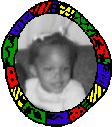Home
by Denise Turney
The street Rebecca Kent lives on is long and narrow. It's not legally wide enough for cars to park on both sides of. If a moving truck pulls in front of an apartment building and parks on the street, car horns will screech until the truck crawls up on a curve, allowing the angry drivers to pass. Yes. The street Rebecca Kent lives on is narrow, but Rebecca can't remember a day when cars weren't parked on both sides of the street.
Children play in the center of the street. They race their sneaker clad feet over broken glass bottles. Sometimes they slip and fall while they run over the roll of a beer can. When it is really hot, the children grab their basketballs, hoola hoops and jacks and take their rhymes, chants and sneaker clad feet into the alley. They laugh, giggle and shout while they call out each other's names. Their loud, rolling voices bounce off the backs of the apartment buildings that line the street, and, echoing, their voices zoom through the neighborhood.
Rebecca's mother graduated from Spellman College in 1972. She didn't have Gwendolyn, the oldest of her three children, until she was twenty-seven years old. She was married then. She still is. No one believes Rebecca when she smiles up into their face and tells them her mother went to college -- not her teenaged sisters' friends, not her school teacher, not the mailman, not the pizza man when he delivers an extra large with everything regular crust pizza to their apartment in the middle of the day on Fridays, not the baker her mother buys cakes and sour dough bread from twice a month. All these people smile at Rebecca's small, round face when she tells them her mother is a college graduate, and, then, rubbing their warm palms back and forth across Rebecca's head, they smile a hard and say, "Sure."
Rebecca's father is full of courage. He met Rebecca's mother while she was studying Advanced Psychology at Spellman College. He was in the Atlanta, Georgia educational hub studying Computer Science at Howard University.
It's hard for Rebecca's father to make people believe he has a master's degree in Computer Science. He can't get a job at a reputable firm. All the employers at these places tell him he is "marginally qualified", a high compliment for a man whose father spent ten years being told by government employers that he lacked the qualifications to carry and deliver mail or drive a city bus.
Rebecca's father works at a computer store selling software. In six months he will have enough money saved to start his own computer software firm. He suffers no delusions. He knows owning and operating his own firm will be hard. He is going forward with his dream.
Many promises embrace Rebecca and her family's future. "As soon as the business has been up and running one day beyond the first violatile year, we're out of here, Baby."
Rebecca, a nosy little pigtailed, African American girl, overhears this and other similar late night conversations shared between her parents in the confines of their small bedroom. The conversations she overhears always make her sad. She doesn't want to move. She doesn't want to leave her friends. She doesn't want to hush her laughter while she waves good-bye to her ribbon headed girlfriends without a smile on her face. She doesn't want to go to a different school. She doesn't want to have to walk outside and call out a new string of names while she stands in front of her family's new house on a new street in a new neighborhood just so she can draw a circle of happy faced friends into her company.
During the summer -- especially on the Fourth of July --- barbecues smell up the air with charcoal, chicken, ribs, baked beans, collard greens, hot dogs, hamburgers and peach cobbler in the yard behind the apartments Rebecca and her family live in. No one hits anyone in Rebecca's family. No one is on welfare. No one receives food stamps or is on Section 8 in Rebecca's family.
The train passes in front of the apartment where Rebecca lives -- Amtrak. It passes twice every hour. Rebecca listens for the train when she is home. The convenient store not all the way around the block from where she and her family live always stocks grape Now Laters and Milk Duds -- Rebecca's favorite candy. When it is so hot in the summer dogs and cats scurry for the shade of an old tree, older boys on the street uncork a fire hydrant. Water sprays the street and the tops, backs and sides of ebony, coffee with cream, toffee and mahogany skinned boys and girls. They hop, jump, skip and laugh real loud while they move around the fire hydrant. A purple and yellow ice cream truck rings these same children to its side later in the summer's evening.
When snow falls fast and hard out of the sky, every child on the street pushes, rolls and pats the snow until one of the biggest snowmen in the city leans against the side of the maintenance building that houses the employees who take care of the row of apartment buildings they and their parents live in.
Spring is for kite flying. Sometimes in the evening after they have run outside all day, the children wrap their kite strings around their warm hands and run up and down the floors of their apartment buildings.
Rebecca and her friends spend the fall leaping in the air then landing in a pile of multi-colored, crunchy leaves. The boys who live on the street do sentimental things like picking a yellow carnation from a garden at the side of a pretty house on the other side of town. They race home and push the flower into the soft hand of a girl whose face always makes them smile and blush.
On warm, balmy evenings, Rebecca plays outside until her mother pushes the kitchen window up and shouts, "Becca! Becca! Come and eat!" The aroma of hot roast beef, meat loaf, baked chicken, stuffing, creamy potatoes, brown gravy mixed with chopped onions, cronbread, collard or turnip greens blows out the window and calls her inside to dinner quicker than her mother's shouting voice does.
Last Friday Rebecca moved quicker than the smell of her mother's delicious home cooking and the sound of her mother's voice. Last Friday Rebecca ran through the front door of her family's home earlier than the evening news came on. Working to catch her breath after double dutching for two hours with a quartet of girlfriends, she plopped her tired bones down on the sofa in front of the television. The news was on.
A newscaster dressed in a navy blue suit snapped out the words, "It is a bleak picture at McKinley Heights, the projects comprising Decatur Street. Children are left unattended there. Crack cocaine addicted mothers show no regard for their own flesh and blood. It is a bad time for McKinley Heights. The people there have lost hope. An ordinance to provide funds to restore McKinley Heights ot its former untarnished state was signed into effect today. But is restoration of McKinley Heights possible? We here at Channel 4 want to hear what you think about this. To state your views, please write us here at the station or call 1-800-222-3333."
Rebecca sat on the sofa. She stared at the television screen. She saw the newcaster's mout open and close, but she no longer heard his baritone voice. Her mind repeated the words, "Decatur Street. Decatur Street."
Decatur Street is a place of wonders to Rebecca's ogling eyes. She hasn't seen any crack cocaine mothers on Decatur Street. She's heard about those people. She knows what they look like. She is scared of them, but there aren't any of those people on Decatur Street. She does see women walking around on Decatur Street who look like they are sleepy all of the time. She sometimes sees elderly men wearing pants that have wet spots on the front. She sometimes sees teenage boys leaning against boarded buildings with their pants unzipped and their heads bowed and nodding all day long, but to six year old, pigtailed Rebecca Kent, Decatur Street isn't a bad place.
Rebecca spent the remainder of the evening from 6:00, when the news came on, until 8:30, when her mother called her along to bed, wondering why the newsman lied. She thought newsmen and newswomen were people who told the truth. They were like the police to her. They were above reproach. Then Rebecca Kent is only six years old and Decatur Street is her home.
 |
Denise Turney is a mother, an administrator and
a freelance writer. She writes regularly for Your
Church magazine out of Chicago, Illinois. Her
work has been published in: Tunnel Times, Crane
News, The Bucks County Courier Times, Modern Dad
Magazine, The Blackstone Circular, Sisters In
Style, The Trenton State College Literary Review,
The Preacher's Magazine, The Empty Shelf, and The
Pittsburgh Quarterly among other various
publications throughout the nation.
May of this year, her novel, PORTIA, debuts at BooksAmerica. |
 |
© Copyright 1998 - Denise Turney. All rights reserved.